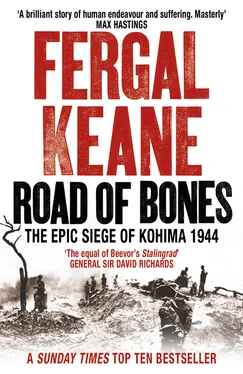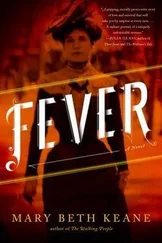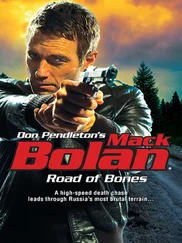The health of 14th Army was one of Slim’s gravest preoccupations. In the retreat of 1942 around 80 per cent of the British and Indian troops fell ill because of disease. British 6 Brigade lost half its strength in the Arakan, a staggering dissolution of fighting capacity. The official account stated that the ‘incidence of malaria during this campaign reached unimagined proportions’.
It struck British and Indian troops with equal force. Major David Atkins commanded a transport unit travelling the road between Dimapur and Imphal and watched his Madrassi drivers falter with fever, one by one. ‘The Havildar clerks and the senior NCOs were changing so frequently because of fever, that orders given to one man were not passed on before the man you had given them to went sick. If you spoke to the new man, he would be replaced the next day by the former one.’
Strict discipline on the taking of medication was enforced in 14th Army: if men started to come down with malaria their officers could be cashiered. It took the sacking of three commanders to drive the point home. Hospital admissions for disease dropped from 185 per thousand troops in 1942 to 100 per thousand in 1944.
There were also changes in surgical practice. Treating wounds sustained in jungle fighting was a different prospect from treatment in Europe or the desert. The humidity, the frequently filthy conditions, the difficulty in finding clean water supplies, all presented an immense challenge to the many young and inexperienced surgeons of 14th Army. Wounds had to be cleaned out thoroughly and quickly, the medical chiefs warned. ‘The Japanese missiles have a habit of carrying not only clothing and equipment, but also jungle debris, leaves and dirt into the deeper parts of the wound.’ In such conditions a man with a minor wound could die from blood poisoning within twenty-four hours. Men were drilled in the importance of field hygiene. As one West Kent put it, ‘You learned to bury your crap and above all keep it away from the water source.’
Slim also recognised that the battle for men’s minds would be central in the fighting to come. In 1943 the C-in-C India, Sir Archibald Wavell, agreed to appoint a psychiatrist to every division in India. Captain Paul Davis was sent to 2nd Division, which would fight at Kohima the following year. He set about weeding out unsuitable men. ‘As a result of this large numbers of dullards, psychoneurotics, and a few psychopaths and psychotics were unearthed. Combatant officers proved to be extremely enthusiastic at the idea of getting rid of these men.’ Davis found most of the commanders he encountered helpful. There had been a shift in military attitudes since the First World War, when shell-shock victims could be regarded as cowards, although there was one battalion commander who asked him, ‘Why should I send these men to you so that they will survive the war and go home and breed like rabbits, whilst all my finest men are going to risk being killed?’ During the battle of Kohima Davis set up a small psychiatric clinic just sixteen miles behind the front.
Slim was aware that neither Churchill nor the CIGS, General Sir Alan Brooke, had much faith in the British and Indian soldier ever being able to meet the Japanese on equal terms in the jungle. Churchill believed that going into the jungle to fight the Japanese was ‘like going into the water to fight a shark’. But the Japanese did not come from a land of jungles and swamps. The jungle was no more a natural environment for them than it was for the British. The Japanese had trained and adapted. Slim’s 14th Army would do the same. An Infantry Committee set up after the Arakan debacle reported that troops needed to be fit and to be led by officers experienced in the jungle; they needed to avoid roads and learn how to use jungle tracks, and to be trained in concealment and jungle hygiene. One of the most prescient recommendations related to leadership: ‘command must be decentralised so that junior leaders will be confronted with situations in which they must make decisions and act without delay on their own responsibility’. To this, Slim added his own developing philosophy of jungle warfare. If encircled, stand fast and hold your ground, rely on air support for resupply and trust in the reserves to come up and hit the Japanese. They would outflank the enemy and cut their line of communication. Tens of thousands of men passed through the jungle training courses, where they were drilled in the basic dogma of encircle and outflank. Above all they learned to live with the strangeness of the jungle.
As he planned his reconquest of Burma, Slim recognised that ultimate victory would depend on the soldiers of the Indian Army. More than two thirds of his 14th Army were drawn from the immense hinterlands of the empire, the majority from India itself. In the British mythology of the Raj few figures were more warmly drawn than that of the faithful native. In novels like Talbot Mundy’s For the Salt He Had Eaten , the Indian soldier risking, and often giving, his life for the white sahib is eulogised: ‘Proud as a Royal Rajput – and there is nothing else on God’s green earth that is even half as proud – true to his salt and stout of heart.’
By the end of 1943 the Indian Army had experienced surrender in Singapore, retreat in Burma, defeat in the Arakan, and the convulsions caused by the Quit India movement. * Yet it had not risen as a body in mutiny or experienced mass desertions. There were more than two million men serving the allied cause in North Africa and India, the largest volunteer army in history. In spite of this, Churchill frequently expressed his mistrust. Wavell noted in his journal in 1943 that the prime minister feared the army could rise at any moment, ‘and he accused me of creating a Frankenstein by putting modern weapons in the hands of sepoys, spoke of 1857, and was really childish about it. I tried to reassure him, both verbally and by a written note, but he has a curious complex about India and is always loath to hear good of it and apt to believe the worst.’
The events that followed the fall of Singapore had done much to stoke the prime minister’s paranoia. On their surrender, between 40,000 and 60,000 Indian prisoners of war had joined the new pro-Japanese Indian National Army (INA). * The INA, under the leadership of the charismatic former Congress politician Subhas Chandra Bose, would play only a minor role in the fighting to come. But Bose’s promise that India would rise once his men had crossed the border encouraged the Japanese and worried the British.
One of Slim’s most able commanders, General Sir Philip Christison, found himself being teased about army loyalty at the birthday party of the Maharajah of Mysore, Jayachamaraja Bahadur, in Krishnarajasagara. The general’s host was one of the most sophisticated men in the East, a philosopher and musicologist who once sponsored a concert for Richard Strauss at the Royal Albert Hall. He was also regarded as a friend of the British. ‘This was a great occasion,’ recalled Christison, ‘and not affected by any wartime restrictions.’ On the night of the party the palace was lit with 30,000 light bulbs and fireworks banged and whizzed across the sky. At the top of the palace steps Christison was greeted by the genial figure of the maharajah, who was standing between two huge stuffed bison. There was a grand procession into the dining hall and after a lavish banquet the ruler decided to take the general into his confidence. ‘He told me he had two sons. When Japan entered the war he sent one to Japan … the other to serve in the British Army. “Who knows who will win?” he said.’
The Japanese intelligence officer Lt.-Colonel Iwaichi Fujiwara, who worked closely with Bose, learned to be circumspect about the INA’s military capabilities, writing of Bose that ‘the standard of his operational tactics was, it must be said with regret, low. He was inclined to be idealistic and not realistic.’ However, the British were certainly alert to the political and intelligence danger posed by the INA. During the Bengal famine of 1942–43, when between one and a half and three million people died, Bose had announced that he would send Burmese rice to feed the starving, and INA broadcasts placed the blame for the catastrophe on British indifference and incompetence. * The Japanese war leader, Prime Minister Hideki Tojo, fanned the flames assiduously, declaring in the Diet on 16 June 1943: ‘We are indignant about the fact that India is still under the ruthless suppression of Britain … we are determined to extend every possible assistance to the cause of India’s independence.’
Читать дальше












